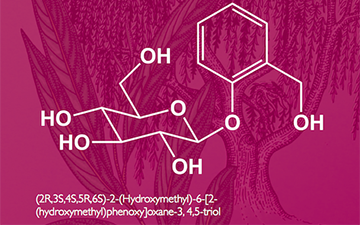Salicin is an alcoholic β-glucoside. Salicin is an anti-inflammatory agent that is produced in willow bark.[2]Salicin is also commonly found in the bark of Populus species, and the leaves of willows and poplars. It is also found in castoreum, which was used as ananalgesic, anti-inflammatory, and antipyretic. The activity of castoreum has been credited to the accumulation of salicin from willow trees in the beaver’s diet, which is transformed to salicylic acidand has an action very similar to aspirin.[3] Salicin is closely related in chemical make-up to aspirin. When consumed, the acetalic ether bridge is broken down. The two parts of the molecule, glucose and salicylic alcohol, then are metabolized separately. By oxidizing the alcohol function the aromatic part finally is metabolized to salicylic acid. Salicin elicits bitterness like quinine, when consumed.[4] Alkaline cleavage of the glucoside populin produces benzoate and salicin.[5]
Mild side effects are standard, with rare occurrences of nausea, vomiting, rash, dizziness and breathing problems. Overdose from high quantities of salicin can be toxic, damaging kidneys, stomach causing ulcers, diarrhea, bleeding or digestive discomfort. Some people may be allergic, or sensitive to salicylates, similar to reactions to aspirin. Others that are advised against taking salicin are those with asthma, diabetes, gout, gastritis, hemophilia, stomach ulcers, children under 16, pregnant and breastfeeding women. [6][7]
(From Wikipedia, July 2015)


